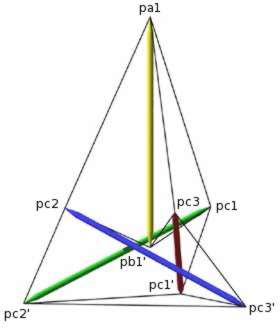
Aspension Skylon II with Point Labels
structure file: marcus/x3l2marcuse.rc
variable file: marcus/x3l2marcuse.dat
digit list: src/mm.dls
|
Member Descriptions
[name, end point names, weight (if in objective function),
second power of length (if a constraint), member category,
Obj/Con/Exc (put in objective function, use as a constraint or
exclude from computations), flags]
For assembly purposes, only the name and end point names are
of interest. The other information may be of interest after
A Practical Guide to Tensegrity Design has been consulted.
# struts
<Member> struta pb1' pa1 -1.0 sqr(0.60) 1 Con *
<Member> strutc1 pc2' pc1 -1.0 sqr(0.60) 1 Con *
<Member> strutc2 pc3' pc2 -1.0 sqr(0.60) 1 Con *
<Member> strutc3 pc1' pc3 -1.0 sqr(0.60) 1 Con *
# interlayer tendons
<Member> xltc1 pc1' pc1 1.0 0.0 3 Obj *
<Member> xltc2 pc2' pc2 1.0 0.0 3 Obj *
<Member> xltc3 pc3' pc3 1.0 0.0 3 Obj *
<Member> xltb1 pb1' pc1 1.0 sqr(0.25) 3 Con *
<Member> xltb2 pb1' pc2 1.0 sqr(0.25) 3 Con *
<Member> xltb3 pb1' pc3 1.0 sqr(0.25) 3 Con *
<Member> xlta1 pa1 pc1 1.0 sqr(0.55) 3 Con *
<Member> xlta2 pa1 pc2 1.0 sqr(0.55) 3 Con *
<Member> xlta3 pa1 pc3 1.0 sqr(0.55) 3 Con *
# end tendons
<Member> endc1' pc2' pc1' 1.0 sqr(0.58762079226) 4 Con *
<Member> endc2' pc3' pc2' 1.0 sqr(0.58762079226) 4 Con *
<Member> endc3' pc1' pc3' 1.0 sqr(0.58762079226) 4 Con *
In-Situ Member Lengths
These are the lengths of the members when they are in place
and prestress is applied. The strut lengths are from pin insertion
point to pin insertion point, as are the tendon lengths.
The values are in model units.
struta: 0.6 strutc1: 0.6 strutc2: 0.6
strutc3: 0.6 xltc1: 0.301195 xltc2: 0.301195
xltc3: 0.301195 xltb1: 0.25 xltb2: 0.25
xltb3: 0.25 xlta1: 0.55 xlta2: 0.55
xlta3: 0.55 endc1': 0.587621 endc2': 0.587621
endc3': 0.587621
Relative Member Force Magnitudes
These values are useful for developing an assembly
strategy for the structure. The tighter tendons are much
easier to tie in place early on, while the looser tendons
can be left to the last. This information is also used
to adjust tendon lengths since the measured length of a tendon
will be shorter for a highly-stressed tendon with the same
in-situ length as a tendon which is not so stressed.
struta: -0.641147 strutc1: -0.6 strutc2: -0.6
strutc3: -0.6 xltc1: 0.301195 xltc2: 0.301195
xltc3: 0.301195 xltb1: 0.534289 xltb2: 0.534289
xltb3: 0.534289 xlta1: 0.235087 xlta2: 0.235087
xlta3: 0.235087 endc1': 0.229129 endc2': 0.229129
endc3': 0.229129
Average tendon force magnitude: 0.324925
Construction Lengths (in millimeters and halves)
The construction length of a tendon is less than the in-situ
length since when the tendon is measured off it isn't under
any prestress force. The construction length for the strut
represents the length of the 3/16-inch-diameter wooden dowel.
The tendons were made of 12-lb.-test braided nylon fishing line.
In this case, the attachment point at the hubs was a simple
metal pin stuck into the end of the strut, so no member-length
adjustments were necessary. Prestress forces are assumed
not to affect strut lengths.
Elongation of Tendon of Unit Cross Section
Under Force of Average Magnitude (fraction)> .02
Length Scale Factor> 100/0.6
Strut and Tendon Hub Adjustments - s;t> 0 0
struta: 100 0 strutc1: 100 0 strutc2: 100 0 strutc3: 100 0
xltc1: 49 1 xltc2: 49 1 xltc3: 49 1 xltb1: 40 1
xltb2: 40 1 xltb3: 40 1 xlta1: 90 1 xlta2: 90 1
xlta3: 90 1 endc1': 96 1 endc2': 96 1 endc3': 96 1

Aspension Skylon II with Point Labels
structure file: marcus/x3l2marcuse.rc
variable file: marcus/x3l2marcuse.dat
digit list: src/mm.dls
|
|
CONTACT: Bob Burkhardt Tensegrity Solutions Box 426164 Cambridge, MA 02142-0021 USA e-mail: bobwb@juno.com |